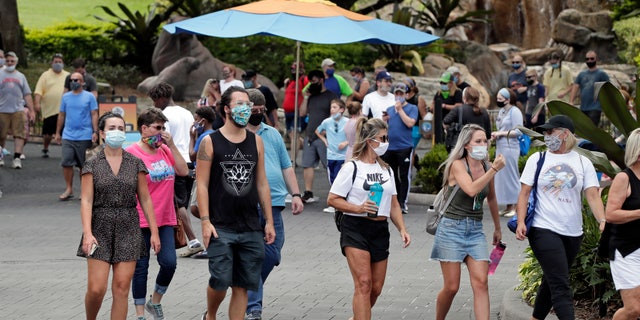New cases of the novel coronavirus broke single-day records in Florida and South Carolina on Thursday, according to health officials.
The Florida Department of Health confirmed 1,698 additional cases of COVID-19 within the preceding 24 hours, nearly a 20 percent increase from the state’s previous high of 1,419 reported last Thursday.
Health officials in Florida have now confirmed at least 966 new positive cases every day since June 3, which comes after the state began its reopening process last month. Florida has more than 67,456 total coronavirus cases and at least 2,848 deaths, according to the department.
FAUCI: ‘NIGHTMARE’ CORONAVIRUS PANDEMIC IS FAR FROM OVER



Guests wearing masks stroll through SeaWorld as it reopened with new safety measures in place Thursday, June 11, 2020, in Orlando, Fla. The park had been closed since mid-March to stop the spread of the new coronavirus. (Associated Press)
South Carolina also recorded a record total of 687 coronavirus cases on Thursday — surpassing its previous high of 542, set just three days earlier — the state’s Department of Health and Environmental Control reported, according to Columbia’s WLTX-TV. South Carolina now has at least 16,441 confirmed COVID-19 cases, based on data from Johns Hopkins University.
Florida started its reopening process in May, which was a month that saw all 50 U.S. states begin to ease their coronavirus restrictions. Now, a sudden rise in cases has been reported throughout much of the U.S., amid street protests and states’ reversals of shutdown policies.
In recent days, the U.S. saw a 36.5 percent increase in daily cases, a striking difference compared to the top 10 other countries with the most COVID-19 infections to date, according to data from the Centers for Disease Control and Prevention (CDC) obtained by Yahoo News.
It comes as many Americans had long awaited an end to quarantine and a return to normalcy. Concerns over the severe economic downtown have also expedited the reopening process.
Now in June, cellphone data suggests people are moving around in the U.S. at a level that’s roughly 61 percent of what was considered normal behavior before the pandemic.
“It seems that we, the U.S., has given up and accepted this disease as a facet of life,” Jeffrey Shaman of the Columbia University School of Public Health told NPR. “It didn’t have to be this way, and it still doesn’t going forward.”
CORONAVIRUS IN THE US: STATE-BY-STATE BREAKDOWN
A total of 12 other states outside of Florida and South Carolina have also recorded a seven-day average high of new coronavirus cases since the pandemic began. The states are Alaska, Arizona, Arkansas, California, Kentucky, New Mexico, North Carolina, Mississippi, Oregon, Tennessee, Texas, and Utah, according to data by the Washington Post.
“Worse times are ahead,” said Joe Gerald, a public health researcher at the University of Arizona, who is helping to provide projections to the state’s health department, told the paper. “The preponderance of evidence indicates community transmission is increasing.”
While testing has increased, some experts believe that’s not the main reason for the sudden rise in cases.
“It’s very clear that it’s a real increase in community spread,” Will Humble, executive director of the Arizona Public Health Association, told Phoenix’s KJZZ radio station. “It’s not some artifact of additional testing.”
Health officials also fear the nationwide protests that saw thousands of people within close contact of each other could contribute to the spread of COVID-19 — even if they’re wearing masks.
“Masks can help, but it’s masks plus physical separation,” Dr. Anthony Fauci said in an interview on “Good Morning America” Wednesday. “And when you get congregations like we saw with the demonstrations … that’s taking a risk.”
IN NYC, BLOCK-PARTY VIBE THE NEW NORMAL AMID CORONAVIRUS REOPENINGS
Others worry that after months of quarantine and believing the worst has passed — fatigue regarding the virus has already set in.
“The worrisome thing for me is that there’s a lot of fatigue in the population overall,” Wafaa El-Sadr, professor of epidemiology at Columbia University, told The Guardian.
“People feel they have done distancing and they are thirsting to get outside and connect with each other. If this surge requires us taking a step back, how do we convince people to do that? I feel we’ve made five steps forward and now maybe one step back.”
Due to the recent spike in cases, Ashish Jha, head of Harvard’s Global Health Institute said in an interview with CNN that he believes fatalities from the virus would nearly double in the U.S. by the fall unless action was taken to limit its spread.
CLICK HERE FOR COMPLETE CORONAVIRUS COVERAGE
Amid the sudden rise in cases, recommended steps to limit the spread of the virus include contract tracing, increased testing, mask usage, and continued social distancing, Reuters reported.

